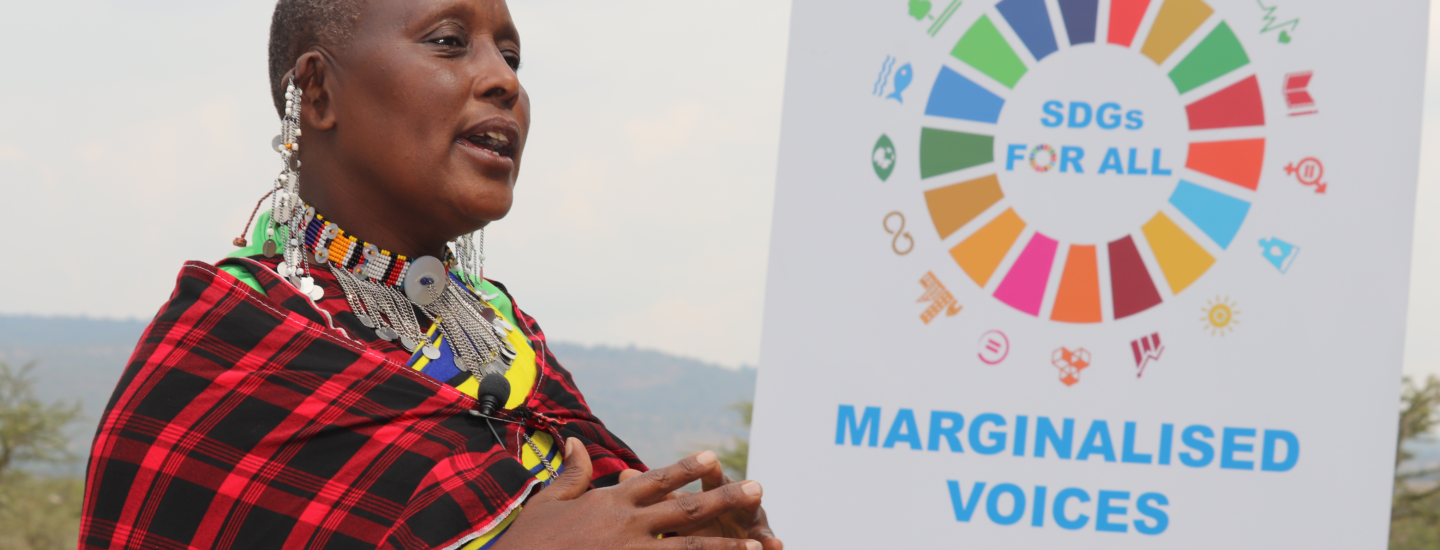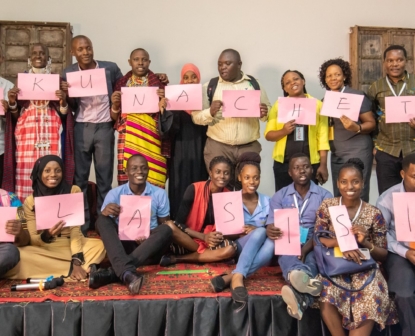Project
The Sustainable Development Goals In My Language
-
Amount Funded
15,000 EUROProject Duration
01 Apr 2020 - 31 Mar 2021 -
-
Lead organisation
Oltoito Le Maa (OLM)
-
Oltoito Le Maa (OLM) was established to fill the vacuum of the drastically shrinking civic space in Tanzania which is worse for marginalised communities like the Maasai. The main goal is to provide space for indigenous communities to engage directly with government and stakeholders with a united voice on the issue of human and land rights, political participation and decision making.
OLM’s main programme is working with communities to facilitate video-making as tools of advocacy. From 2016, it has been able to facilitate making 23 videos on different subjects related to human rights and civic space.
OLM has been able to facilitate that communities in Loliondo engage the government of Tanzania and the most ground-breaking achievement was for the famous award-winning video (Olosho) to be screened before the Prime Minister of Tanzania.
-
Organisation
Oltoito Le Maa (OLM) was established to fill the vacuum of the drastically shrinking civic space in Tanzania which is worse for marginalised communities like the Maasai. The main goal is to provide space for indigenous communities to engage directly with government and stakeholders with a united voice on the issue of human and land rights, political participation and decision making.
OLM’s main programme is working with communities to facilitate video-making as tools of advocacy. From 2016, it has been able to facilitate making 23 videos on different subjects related to human rights and civic space.
OLM has been able to facilitate that communities in Loliondo engage the government of Tanzania and the most ground-breaking achievement was for the famous award-winning video (Olosho) to be screened before the Prime Minister of Tanzania.
-
Project
Global leaders have endorsed the Sustainable Development Goals (SDGs) (2015-2030) as a global commitment roadmap to achieving sustainable and inclusive development. With the #leavenoonebehind manifesto that guides the implementation of SDGs, this initiative documents the SDGS in the Maa language by using a participatory video and facilitating discussions within the community. This is the first time, the Maasai community has time to reflect and associate themselves with the SDGs and development as a whole.
The project The Sustainable Development Goals in My Language is supporting the organisation to be able to assist the rightsholder groups to embark on a process of defining development, translate SDGs and relate them to their context. With this illiterate group, the participatory video is the most appropriate methodology to document their scrutiny and analysis and get clear messages for the policymakers.
This initiative is based on the fact that the time has come for local knowledge system, ideology, legal traditions, customary and cultural practices to be appropriately recognised. To achieve this, OLM endeavours to illustrate an important aspect of such recognition through this project.
Through facilitating articulation of the Maasai community’s perception and understanding of SDGs, it contributes to the achievement of these goals through video, and provides space for dialogue with government and other stakeholders to influence implementation of SDGs by making it work for the Maasai indigenous community.
The project gives more influence to the Maasai community on communicating their perspective on the SDGs and effective participation in its implementation.
-
-
Global leaders have endorsed the Sustainable Development Goals (SDGs) (2015-2030) as a global commitment roadmap to achieving sustainable and inclusive development. With the #leavenoonebehind manifesto that guides the implementation of SDGs, this initiative documents the SDGS in the Maa language by using a participatory video and facilitating discussions within the community. This is the first time, the Maasai community has time to reflect and associate themselves with the SDGs and development as a whole.
The project The Sustainable Development Goals in My Language is supporting the organisation to be able to assist the rightsholder groups to embark on a process of defining development, translate SDGs and relate them to their context. With this illiterate group, the participatory video is the most appropriate methodology to document their scrutiny and analysis and get clear messages for the policymakers.
This initiative is based on the fact that the time has come for local knowledge system, ideology, legal traditions, customary and cultural practices to be appropriately recognised. To achieve this, OLM endeavours to illustrate an important aspect of such recognition through this project.
Through facilitating articulation of the Maasai community’s perception and understanding of SDGs, it contributes to the achievement of these goals through video, and provides space for dialogue with government and other stakeholders to influence implementation of SDGs by making it work for the Maasai indigenous community.
The project gives more influence to the Maasai community on communicating their perspective on the SDGs and effective participation in its implementation.
-
Within the span of 12 months, Oltoito Le Maa (OLM) successfully accomplished the objectives set forth at the inception of the project. OLM created a video to serve as a tool for facilitation and engagement, highlighting the Maa community’s perspectives on development. Additionally, they translated the 17 Sustainable Development Goals (SDGs) into the Maa Language and disseminated them to enhance public comprehension of UN development goals, fostering community involvement in shaping a collective understanding of development. The overarching aim is to utilize community perceptions and translations to foster informed dialogues and engagements with the government.
The project engaged 400 stakeholders, averaging approximately 100 per village, encompassing 210 women, 90 youth (aged 15-25), 87 elders (aged 50-70), and 13 individuals with disabilities. OLM successfully advocated to the district’s top leadership—including the District Executive Director (DED), District Commissioner (DC), District Community Development Officer (DCDO), and District Cultural Officer (DCO)—on the critical necessity of localizing and contextualizing SDGs to facilitate community participation effectively.
Furthermore, OLM translated 100 project brochures into Swahili and Maa languages, distributing them to project villages, partners, and the District Council. Through screenings and dissemination sessions, the Maasai community developed a shared definition of development emphasizing sustainability, diversity, identity, and self-determination. They emphasized that neglecting these aspects would perpetuate a focus on cultural transformation and impose a one-size-fits-all approach to development.
OLM anticipates finalizing the project’s second phase and plans to expand it to ten additional villages. They intend to screen the video, facilitate discussions, and aid in crafting local solutions for issues amenable to local management.
- News




